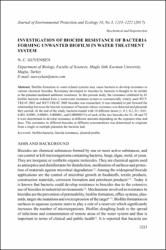INVESTIGATION OF BIOCIDE RESISTANCE OF BACTERIA FORMING UNWANTED BIOFILM IN WATER TREATMENT SYSTEM
Abstract
Biofilm formation in water-related systems may cause bacteria to develop resistance to various chemical biocides. Resistance developed to biocides by bacteria is thought to be similar to the plasmid-mediated antibiotic resistance. In this present study, the resistance exhibited by 61 biofilm bacteria isolated from a wastewater treatment system to commercially widely used WET-TREAT 2002 and WET-TREAT 2008 biocides was researched. It was intended to put forward the relationship between the biocide resistance of bacteria whose resistance was detected and plasmids they carried. At the end of the study, bacteria treated with 10 different doses (1, 0.5, 0.2, 0.1, 0.01, 0.001, 0.0001, 0.00001, 0.000001, and 0.0000001%) of each of the two biocides for 24, 48 and 72 h were determined to develop resistance at different amounts depending on the exposure time and dose. This resistance to different biocides at different concentrations was determined to originate from a single or multiple plasmids the bacteria had.


















